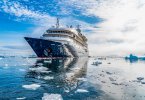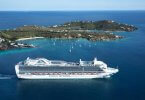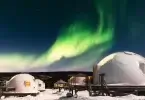
Courtesy Maple Leaf Adventures
Tour companies rooted in conservation wed travel with environmental consciousness.
By Karen Gardiner on January 06, 2021
In early spring, wilderness tour company Maple Leaf Adventures typically prepares for the start of its season. The company operates three small boats out of Vancouver Island on boutique-style 5- to 11-day expedition cruises to destinations including southeast Alaska and British Columbia’s Gulf Islands, Haida Gwaii and Desolation Sound. In March 2020, however, the pandemic forced that prep work to a sudden halt.

Having done all the maintenance work, “training the crew, all of that,” co-owner Kevin Smith says the company came to the realization that there wasn’t going to be a season. There was an “incredible uncertainty,” he says, “and fear that the entire world [his family-run company had] built up over three decades, was, all of a sudden, just going to cease to exist.”
All of them facing the same unprecedented challenges, Maple Leaf Adventures joined forces with four other small tour ship operators in the area—Outer Shores Expeditions, Bluewater Adventures, Mothership Adventures, and Ocean Adventures—companies that would, in a normal year, be direct competitors. With the blessings of the First Nations in whose territory they operate, the group of five worked out a plan to not only keep their 100+ core crew employed, but also to use the canceled season as a way to give back to the British Columbia coastline that they know and love.
In summer, the group’s fleet of tourism ships embarked on two 21-day expeditions with a different, ambitious, purpose: to clean up marine debris along the outer coast of the Great Bear Rainforest, one of the world’s largest remaining tracts of unspoiled temperate rainforest. Funded as part of British Columbia’s COVID-19 stimulus, this Marine Debris Removal Initiative (MDRI) collected 127 tons of marine waste, including plastics, fishing nets and tsunami debris, from over 600 miles of coastal beaches in some of the region’s most remote and difficult-to-reach spots. A related in-shore cleanup was done by members of Coastal First Nations communities.

Because Maple Leaf Adventures is a small ship company (its biggest vessel accommodates only 24 passengers), it is, unlike bigger ships, now permitted to sail. The company is also seeing increased bookings for private group charters and, in 2021, private arrivals for those charters will be possible via helicopter, thanks to a new heli-deck on its 138-foot catamaran Cascadia. When the season begins in spring, the company plans to incorporate lessons from the MDRI experience into its trips. “What we learned from this is that it’s incredibly satisfying to do,” says Smith, “the crew feel good when we leave a place cleaner than when we found it.” Passengers, they hope, can become part of the mission, even in a passive way such as by simply booking a cruise. “We’re pitching the government to do a whole bunch of reference sites on the coast, places that we would get back to with our guests on a regular basis. We’d record the level of marine debris: it’d be kind of like citizen science. We’ll do a measured amount of collection and then, over the decades, know what’s still coming. That will lend to the argument that more work needs to be done to stop what’s entering the oceans.”

The company has always been rooted in conservation and committed to protecting the environment in which it operates. Set sail with them on an expedition, through glittering fjords and past teeming waterfalls and spectacular mountains, and you’ll quickly understand why. Maple Leaf Adventures has been running trips to the Great Bear Rainforest, home to the rare Kermode (or “spirit”) bear, a strikingly white subspecies of the black bear, for longer than any other company, and it’s one of their most popular expeditions. The company’s owners feel a responsibility to be stewards of the land. “We really want to use our tourism to protect these places,” says Smith.

Passengers can feel good knowing that their trip will be doing good. “It’s in the DNA of Maple Leaf Adventures that we see the natural world as a place to protect,” says Smith. “The company has always done that, before it was trendy or marketable.”
This kind of symbiotic relationship with place is, in fact, becoming even trendier. The concept of regenerative tourism (leaving destinations better than you found them) is one of the most prominent buzzwords for the post-pandemic travel era. Embark on a Maple Leaf Adventures expedition in 2021 or beyond and you may be helping contribute to the conservation of the very area—the coastline, remote beaches and rainforest—that you experience.







